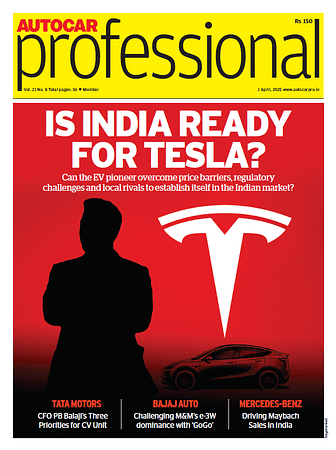Erratic demand in EVs is due to uncertainty over incentives: Mercedes Benz India's Santosh Iyer
“The adoption of EVs will depend on how this gap can be bridged by incentives from the government. The real transition happens when auto industry voluntarily shifts to EVs and to drive the demand, we have to first get the narrative right,” he said.
Amidst a global slowdown in electric vehicle adoption, Mercedes-Benz launched its first-ever all-electric Mercedes-Maybach EQS 680 SUV at a starting price of Rs 2.25 crore at the company’s Chakan plant in Pune. On the sidelines of the event, Santosh Iyer, Managing Director & CEO, at Mercedes-Benz India told Autocar Professional that even though policy flip flops are hurting EV adoption in India, he remains optimistic about the long-term transition of the industry and hopes to maintain a double-digit growth projection for the company fuelled by its new launches.
“This is an expensive technology also it hasn’t got scale so it becomes even more expensive for the customer. The customer today is not ready to pay a premium for a sustainable mobility option. Some governments have incentives but the erratic demand in EVs is because of the uncertainty of these incentives because many governments have the pressure to continue these incentives for some period of time,” Iyer said.
He added that larger adoption of EVs will not happen till the time the price parity doesn't match globally as well as in India. “The adoption of EVs will depend on how this gap can be bridged by incentives from the government. The real transition happens when auto industry voluntarily shifts to EVs and to drive the demand, we have to first get the narrative right,” he adds.
According to Iyer these “mixed signals” are leaving the customers confused about EV adoption. “Should they go for an intermittent technology? Should they go for the future? And this actually slows down the transition for EVs. We should go all in. Unfortunately, some states go back and forth due to financial compulsion. But the future will depend on customer acceptance, government policies and new product launches,” he said.
Despite the challenges, Iyer is confident about the EV penetration in the company’s overall portfolio. Mercedes-Benz reported a 9 per cent growth at 9,262 units in sales in India in the first half of 2024, its highest ever half yearly sales in the country and its EV sales—which grew by 60 per cent year-on-year—accounted for over 5 per cent of the total sales volumes.
Last year, the company saw has 2.5% penetration in its portfolio which has grown to 5% this year. “It can be debated and argued whether you need a hockey stick growth or whether you can grow sustainably. Hardly 7-8% of the dealerships network sell an EV today. So, in the next 3-4 years, when most of the OEMs introduce their cars, they will have more portfolios and the transition will start happening at a much faster pace,” he adds.
He said that while he would love for the transition to happen at a much faster pace, policy making has a major role to play. “In Telangana we reached 10% penetration. Now, we are back to 4-5% because the road tax changes. As an industry, we are at a very unique advantage because we have very high tax on cars which is not the case anywhere in the world. And for EVs it's easier for the government to give a lower tax. So, there’s a 48% average tax on a SUV and now when you look at EVs, it's 5%. This should help EVs in better pricing,” he said.
Talking about investments, he said that the company will stick to its commitment of investing Rs 200 crores for this year taking their total investment to Rs 3000 crores. “We are on the same glide path and there is no cutting back when it comes to our roadmap. We are fully on strategy when it comes to product launches and introduction of car lines,” he said.
This is the 10th product launch from the company this year and it will see two more launches by the end of the year and with the launch of the Maybach EQS 680 SUV, its BEV portfolio now comprises of 5 BEVs from the company.
Earlier this year, Mercedes-Benz global CEO Ola Källenius—who earlier had plans of making the product portfolio fully electric by the end of the decade globally—said that it will continue to make combustion-engine and hybrid vehicles “well into the 2030s,” if demand is there. This comes after the company’s margin sank to 9% in the first quarter, the lowest in more than two years due to slow demand for its electric models like the EQS and EQE sedans.
RELATED ARTICLES
AKWEL Reports 32.3% Decline in Net Income in 2024 Amid Market Challenges
AKWEL attributed its financial decline to inflationary pressures on raw materials, components, and payroll costs, compou...
“Customers Swear by Their Quality—We’ll Bring Scale, Capital, and Integration” — Arvind Goel on Recent IAC Acquisitions
Tata AutoComp Chairman Arvind Goel outlines the rationale behind the twin acquisitions in Sweden and the UK and how the ...
Trump Tariffs: Auto Industry Reactions
While the industry did not react to the tariffs when they were first announced in March, many industry voices spoke abou...






 05 Sep 2024
05 Sep 2024
 10613 Views
10613 Views





 Arunima Pal
Arunima Pal


 Ketan Thakkar
Ketan Thakkar


